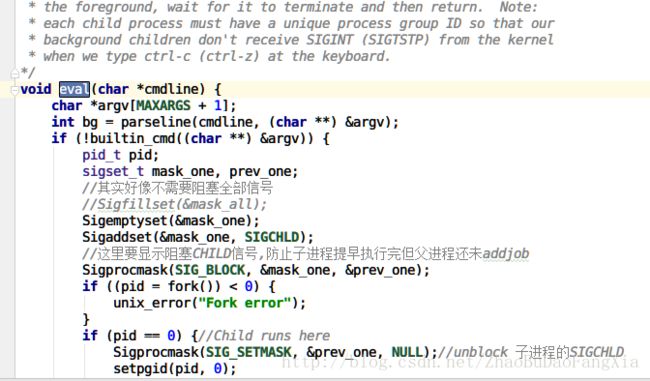csapp实验,一个简单的shell. Lab Assignment L5: Writing Your Own Unix Shell
实验指导书 http://csapp.cs.cmu.edu/3e/shlab.pdf
该知道的在实验指导书都有了,以下是感觉这个实验重要的地方
- 清楚前台和后台的概念,这是shell创造的概念,有外部命令时我们直接去运行的,只不过如果是前台命令会去等待执行完毕,而后台不管。所以信号处理函数都只是对shell而言,按下ctrl+z和ctrl+c都是发给shell的。(这里有一个进程组的概念,信号默认是发给前台进程组的,所以现在发的就是我们自己写的shell了,为了不让外部命令创建的子进程接收到这些信号,要在创建子进程时设置单独的进程组号)
- 要清楚什么时候要阻塞什么信号,为什么要阻塞。像创建子进程时阻塞SIGCHLD是因为可能子进程运行完了,父进程才往jobs里add一个job,为了防止这种情况,要阻塞这个信号,add完再取消阻塞。但不能阻塞全部信号,因为可能收到SIGTSTP或SIGINT。
- 而在SIGCHLD的处理函数中,我阻塞了所有信号,现在看来似乎没有必要,因为另外两个信号处理函数没有对全局的jobs进行操作。不过在这个程序里也没所谓了。信号处理函数最好写得简单一点,waitpid写的地方也少一点,不然就会很乱。下面列下书上说的保守的好习惯吧
- 处理程序尽可能简单。处理程序可能只是简单地设置全局标志并立即返回,所有与接收信号相关的处理都由主程序执行,主程序周期性检查并重置这个标志。
- 在处理程序中只调用异步信号安全函数。这里的异步信号安全函数指的是:要么函数可重入(如至访问局部变量),要么不能被信号处理程序后中断。
- 保存和恢复errno。防止干扰errno
- 阻塞所有信号。保护对共享全局数据结构的访问。像我们这里只有一个处理函数对jobs进行访问,其实可以补阻塞所有信号的。不过这也是一个好习惯吧,毕竟如果哪一天改了,却忘了这里有个隐患呢?
- 用volatile声明全局变量,volatile声明的会告诉编译器补要缓存这个变量,总是从内从读取。
- 使用sig_atomic_t标志,这可以保证对标量的读写是不可中断的(原子的)。
- 哦,还有就是正确使用waitpid的参数,waitpid是默认阻塞的。摄者WNOHANG可以立即返回,设置WUNTRACED可以检查已终止和被停止的子进程,这在前台等待那里有用。
- 还有就是shell在发信号到前台是发到前台整个进程组的,所以kill的时候记得要负数。
- 信号处理函数和收到信号前正在运行的函数是并发的,如果把waitpid这种相对耗时的操作不放在信号处理函数,会不符合实验指导书要求。而且似乎把waitpid放在信号处理函数也更合理。
因为电脑是Windows的,所以敲代码在sublime,然后放到CLion上看看有没有warning,没有就上传到云服务器的Linux下跑,出错的话都是先去思考,想不到才去gdb调试,gdb调试没有IDE那么爽,到断点不能同时看到几个变量的值(也许是不会用),只能一个一个去p。感觉按键盘也没有点鼠标那么快捷。不过还是要多点熟悉Linux下调试吧。打算重装个图形化虚拟机,然后用CLion调试。
把代码放到sublime上会发现好看很多哈,感觉比在CLion上还舒服,而且跳转也方便不少。
在sublime下

在CLion下

/*
* tsh - A tiny shell program with job control
*
*
*/
#include